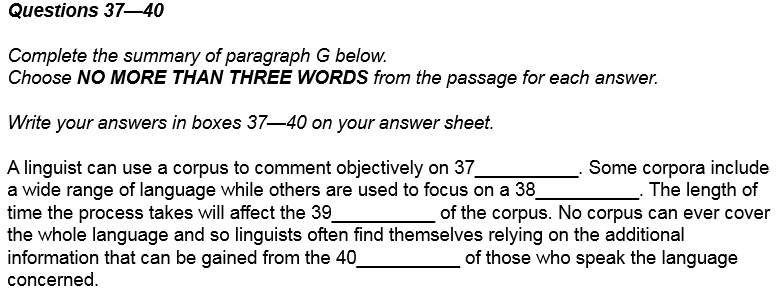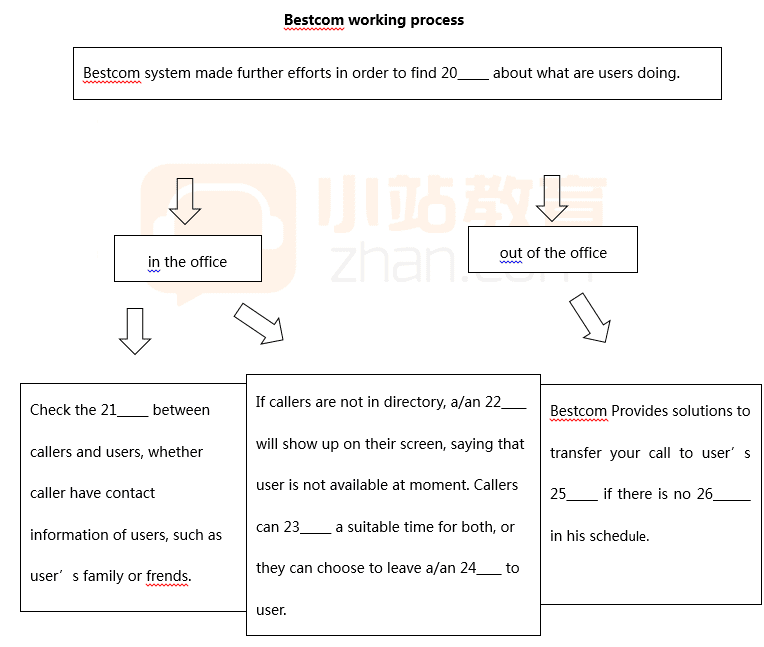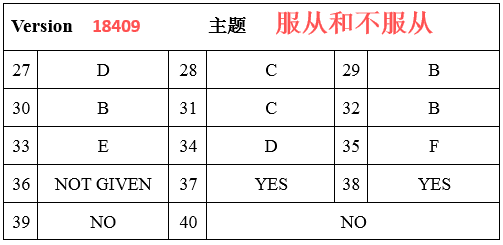GRE阅读的难度一直为广大考生诟病,许多人都觉得阅读部分分数实在难拿。下面小编就和大家分享GRE阅读应对高难度文章题目技巧,来欣赏一下吧。
GRE阅读应对高难度文章题目技巧
五步解题法一:解剖文章首段
积极主动地解读文章的第1段,阅读时尽量记住作者提出的问题(现象或观点),和一些关于文章内容的概念和词汇,如这篇文章讲的是生物化学,日本企业文化还是黑人运动。搞清楚文章的论题和作者想表达的内容。
五步解题法二:揣摩作者思路
在脑子里或者在草稿纸上画一个文章的结构思路题。了解各个段落的目的和主题。GRE阅读理解考察的是考生的答题能力而非阅读能力。考生不必完全掌握整篇文章,了解文章中的每一个细节,当然考试中一般也没有那么多时间。相反,考生应该只读文章段落的第1句,而快速浏览其余部分。当读完这篇文章时,就能对文章的结构思路有总体的把握。
五步解题法三:注意语气过渡词
在快速阅读文章时,考生应特别留意段落开头或者结尾可能出现的语气词和过渡词。这样做有助于对作者思路的把握,从而快速掌握文章大意。
五步解题法四:总结文章大意
在回答问题前,花几秒钟总结一下文章的思路和主题,不要急着看题。理清思路后再开始读题。
五步解题法五:开始答题
根据自己对文章的整体思路来答题。将问题(或选项)定位到文章中具体的某个段落甚至具体的句子。如果时间充足的话可以看完题后先不看选项,根据自己对文章的了解找到答案,然后再跟选项做比较,找出正确答案。
GRE阅读理解的五步解题法就介绍到此,考生如果在面对GRE阅读题时底气不足略有困难,不妨尝试使用这种方法,也许会对你的解题有所帮助。
GRE阅读:长难句的分类
1、长成分
1)长从句做主语、宾语及其他成分
a、主语从句
b、宾语从句
2)长状语
3)层层修饰
4)并列成分
2、常见倒装搭配
(1)及物动词加介词:固定词组的固定搭配中,经常出现倒装情况,如:bring A to B,写作:bring to B A
例:Yet Waltzer’s argument , however deficient , does point to oneof the most serious weaknesses of capitalism-namely , that it brings topredominant positions in a society people who ,no matter howlegitimately they have earned their material rewards , often lack thoseother qualities that evoke affection or admiration.
类似的情况:throw over , insert into , import into , infer from, establish for , advocate as等
(2)及物动词加副词
例:make possible …(单词或者句子)
3、省略的几种情况
(1)重复的成分
(2)让步转折的省略:如although (but)
(3)定语从句引导词的省略which(that )
(4)定语从句的引导词和系动词同时省略,变成后置定语
如:qualities(such as “the capacity for hard work”) essential in producing wealth
4、 短语被分割
如:such as, so that , too to , more than , from A to B , between A and B
5、多重否定
如:Despite these vague categories , one should not claimunequivocally that hostility between recnizable classes cannot belegitimately observed.
6、难句分析举例
Such large, impersonal manipulation of capital and industrygreatly increased the numbers and importance of shareholders as a class, an element in national life representing irresponsible wealthdetached from the land and the duties of the landowners; and almostequally detached from the responsible management of business.
[句子主干]Such large, impersonal manipulation of capital and industrygreatly increased …shareholders as a class, (which was) an element…
[语法难点]本句是典型的非限定性定语从句,难点在其主语和宾语都有较长的短语和of结构限定,并且分句是由两个and相连的3个部分组成的。分句an element…landowners 又带有两个定语从句,一个是(which was)representing…,另一个是(which was)detached…
可见,定语从句的难点在于经常省略“引导词+be”的结构,从而在理解上容易和分词结构相混淆。
[句子翻译] 对资本和企业的这种大规模的非个人操纵大大增加了股东作为一个阶级的数量和重要性。这个阶层作为国计民生的一部分,代表了非个人责任的财富与土地及土地所有者应尽义务的分离,而且也几乎与责任管理相分离。
GRE阅读:文章中词汇的考察形式
首先,新GRE阅读中出现了词汇题,即直接问你某个单词是什么意思
我们在看一道样题中公布的阅读题对于词汇是如何考查的:
Questions 9 and 10 are based on the following reading passage.
Scholarship on political newspapers and their editors is dominated by the view that as the United States grew, the increasing influence of the press led, ultimately, to the neutral reporting from which we benefit today. Pasley considers this view oversimplified, because neutrality was not a goal of early national newspaper editing, even when editors disingenuously stated that they aimed to tell all sides of a story. Rather, the intensely partisan ideolies represented in newspapers of the early republic led to a clear demarcation between traditional and republican values. The editors responsible for the papers' content ―especially those with republican agendas ―began to see themselves as central figures in the development of political consciousness in the United States.
10. In the context in which it appears, "disingenuously" most nearly means
A. insincerely
B. guilelessly
C. obliquely
D. resolutely
E. pertinaciously
如果当年,我们总结的天真纯朴类的单词把握的比较好,如下:
天真纯朴的
ingenuous=guileless=naive=simple=artless=unsophisticated
那么这道题,对于我们的同学来说就完全是送分题,对于GRE阅读能力整体偏弱的中国学生来说,这样的题目必须拿下。而拿下这些题目的最好手段,无疑就是按照我们在老GRE词汇班同样的强度来把握词汇。
更为重要的是,从新老GRE的官方备考指导来看,GRE阅读考察共有13项能力,首当其冲的就是“understanding the meaning of individual words.” 显然,词汇量,是阅读理解的基础。经过研究新GRE的官方备考指导中的阅读文章可以得出结论,新GRE阅读中的词汇难度有了明显的上升,这种上升是由于老GRE中的类反单词进入文章和题目引起的。以下例子中可以反映出该结论。
在新GRE的备考指导阅读中,有一篇2句话的文章。
“a person who agrees to serve as mediator between two warring factions at the request of both abandons by so agreeing the right to take sides later. To take sides at a later point would be to suggest that the earlier presumptive impartiality was a sham.”
若熟悉老GRE类反,马上可以联想到这些题:
类比:intercessor: mediate= translator: interpret
consensus: factionalism=expedition:foot-dragging
反义:faction <> unity
factional <> ecumenical
factious <> cooperative
debunk <> perpetuate to sham
sham <> genuine
同时我们注意到,下划线的词汇在阅读黄皮书中没有出现过。
另外有一篇文章
“Was Felix Mendelssohn(1809-1847) a great composer? On its face, the question seems absurd. One of the most gifted prodigies in the history of music, he produced his first masterpiece at sixteen. From then on, he was recnized as an artist of preternatural abilities, not only as a composer but also as a pianist and conductor. But Mendelssohn’s enduring popularity has often been at odds—sometimes quite sharply—with his critical standing. Despite general acknowledgement of his genius, there has been a noticeable reluctance to rank him with, say, Schumann or Brahms. As Haggin put it, Mendelssohn, as a composer, was a “minor master…working on a small scale of emotion and texture.”
同样,老GRE中考到下划加粗词汇的类比反义题:
类比:prodigy: person= miracle: occurrence
反义:preternatural <> ordinary/prosaic
GRE阅读应对高难度文章题目技巧相关文章:
★ GRE写作:高分技巧
★ GRE写作:写作论据的技巧
★ 阅读心理学与生活有感范文









 扫一扫支付
扫一扫支付


